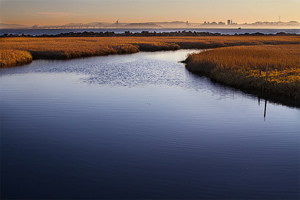That’s a WRAPPPublic Input Could Help Save California Wetlands by Arthur Feinstein After years of indifference, during which more than half of our state wetlands were destroyed, the California State Water Resources Control Board has begun to develop a Wetland and Riparian Area Protection Policy (WRAPP) to fulfill its mission of protecting "all waters of the state." The Board has held scoping hearings and established stakeholders' groups to help develop policies. Not surprisingly, battle lines have been drawn, with the Sierra Club leading the fight for increased regulatory protection and business/industry, local agencies (such as flood control districts), agricultural and timber interests expressing varying degrees of opposition. Having held these stakeholder meetings, the State Water Board staff will now draft a proposed regulatory process that will be revealed in the late spring or summer if things go smoothly. Things rarely do, however. While we wait, wetlands and streams disappear. It won't hurt to bring a sense of urgency to the Water Board staff and remind them that a strong constituency exists demanding that our wetlands and streams be protected. Legislative protection has been slow in coming since wetlands have been neglected for decades. Referred to as "swamps" or "bogs," with connotations of slime and decay, not to mention dripping monsters, they were all too readily covered over to create farmland and housing. The passage of the Clean Water Act in 1972 gave the Army Corps of Engineers the responsibility of regulating our nation's wetlands; the Corps has approved over 99% of building permit applications. Further damage occurs as a result of recent Supreme Court decisions declaring that the Clean Water Act applies only to "navigable" waters, thus effectively excluding small streams, vernal pools, and seasonal wetlands from protection. Not until people began to notice that our waters were impure, that flooding was becoming prevalent in areas historically dry, and that fisheries and wildlife were disappearing did they realize the crucial role wetlands play in sustaining a healthy environment. Wetlands, among their many invaluable functions, purify our waters, sustain over 75% of our fish species, help reduce flooding and (we now know), help sequester large amounts of carbon, thus fighting global warming. Please write to the State Water Board and ask them to develop these regulations promptly. Arthur Feinstein represents the San Francisco Bay Chapter and is a member of the State Water Board's environmental stakeholder group. Arthur Feinsteinhttp://sanfranciscobay.sierraclub.org/environment/shoreline-and-wetlands.htm |
||||
 |
 |
|||
 |
 |
|||